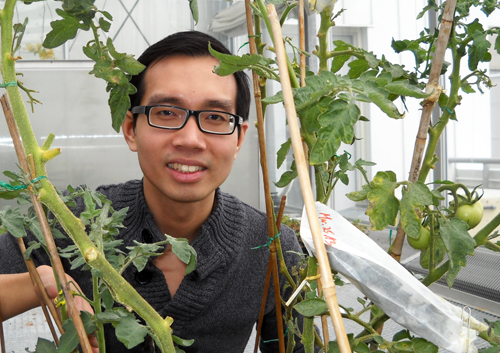
What’s the connection between shrimps and tomatoes? Ask Christian Danve Castroverde, who has studied both along the way to his doctorate in Guelph’s Department of Molecular and Cellular Biology (MCB).
Animal and plant find themselves linked through his graduate research into how organisms ward off pathogenic infections. He hopes his genetics studies will help growers develop disease-resistant plant varieties, not just for tomatoes but for a range of important crops.
Castroverde studies two genes that help tomato plants fight off Verticillium wilt. The fungus affects hundreds of plants, including such common crops as cotton, alfalfa and potatoes. “It’s not just a Canadian problem, but it happens all over the world,” says the PhD student, who came to Canada from the Philippines in 2006.
The pathogen lives in soil and infects plants through their roots. After it enters their vascular system, it hinders plants from taking in water and nutrients. Infected plants wilt and die. Growers have no choice but to pull out and discard infected specimens.
No effective pesticide exists, says Castroverde. Most growers rely on soil testing to make sure their plot is fungus-free.
Looking for alternatives, biologists are now peering into plant genes.
Some tomato plants can resist the disease, an ability that scientists have traced to two particular genes resembling resistance genes in other crop plants. These genes code for proteins that recognize fungal infection. “I’m trying to characterize how that happens.”
Castroverde is looking at how those genes help the tomato resist the disease. He’s also studying nearby promoter regions of DNA that act like on-off switches to regulate those genes.
He manipulates genes in the Science Complex lab shared by his co-advisers, MCB professors Jane Robb and Ross Nazar.
Castroverde has placed genes from resistant plants into susceptible plants and shown that the latter gain some protection from the disease.
He cautions that his research is basic lab-bench investigation, and that other factors besides gene regulation affect disease resistance and crop yield. Other scientists would have to do more work to see whether engineered plants still produce enough tomatoes with desired qualities.
What interests the Guelph student is the unseen battle being waged inside the plant tissues. “The molecular mechanisms of the fight between host and pathogen always excite me, because you’re dealing with two organisms, two systems, it’s the interplay between them.”
During his B.Sc., he looked at a bacterial pathogen of shrimp. That creature is hardly related to tomatoes, he says, but “there are more things in common in life than differences.”
He finished that degree at the University of the Philippines-Diliman with Cynthia Hedreyda. By then, his family had moved to Canada, so he followed them here.
Working in Mississauga, Ont., Castroverde learned of U of G from his employer, a Guelph grad. The University’s science strengths attracted him – and U of G turned out to be one of only a few Canadian universities that recognized his earlier degree from the Philippines.
“I loved the university-town feel of Guelph. It’s away from the GTA but not too far.”
He completed his master’s degree in the same lab in 2010 and began his PhD as a Vanier scholar.